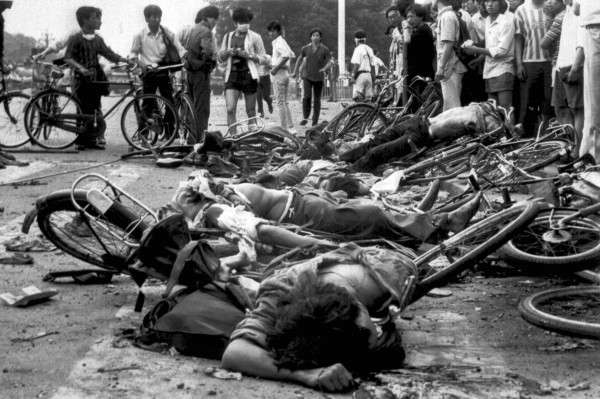Photo via the ASSOCIATED PRESS
NEW YORK TIMES: The interviews and documents show that even at the time, few in the military wanted to take direct responsibility for the decision to fire on civilians. Even as troops pressed into Beijing, they were given vague, confusing instructions about what to do, and some commanders sought reassurances that they would not be required to shoot. In an interview, a former party researcher with military ties confirmed the existence of a petition, signed by seven senior commanders, that called on the leadership to withdraw the troops. “The people’s military belongs to the people, and cannot oppose the people,” stated the petition, according to the former researcher, Zhang Gang, who was then trying to broker compromise between the protesters and the government. “Even less can it kill the people.” In the end, General Xu agreed to pass the orders to his officers, but not to lead armed troops into the capital. He was arrested, expelled from the party, and served four years in prison, Mr. Yang said. […]
But General Xu was not the sole dissenter within the military elite. Col. Wang Dong, a People’s Liberation Army officer and aide to a respected veteran commander, organized the petition of military leaders opposed to martial law, said Mr. Zhang, the former researcher. With Colonel Wang now dead, Mr. Zhang and others decided that the time had come to step forward with details of his role organizing the petition. Mr. Deng and his allies were so alarmed by spreading misgivings about martial law that they disconnected many of the “red phones” that allowed senior officials to speak with one another, Mr. Zhang said. But Colonel Wang offered to use his elite connections to organize a show of dissent from within the military. […]
In interviews, several of those who took part in back-channel efforts to defuse the crisis described how Colonel Wang held a secret meeting with Wang Juntao and Zhou Duo, two liberal intellectuals who were trying to avert a military assault, even as they chided protesters for disorganization and naïveté. Both men recalled a long night in Mr. Zhou’s home when they peppered Colonel Wang with questions about attitudes in the army. He played down the risk of mass bloodshed, both men recalled. “He said, ‘If the Communist Party fires on and kills ordinary people, then wouldn’t the Communist Party be committing suicide?’ ” Mr. Zhou, who lives in Beijing, said in a phone interview. He said they “absolutely never imagined it would turn out as brutally as it did.” MORE

